Zen Read online
Produced by Greg Weeks, Stephen Blundell and the OnlineDistributed Proofreading Team at https://www.pgdp.net
ZEN
By JEROME BIXBY
_Because they were so likable and intelligent and adaptable--they were vastly dangerous!_
Illustrated by ASHMAN]
It's difficult, when you're on one of the asteroids, to keep fromtripping, because it's almost impossible to keep your eyes on theground. They never got around to putting portholes in spaceships, youknow--unnecessary when you're flying by GB, and psychologicallyinadvisable, besides--so an asteroid is about the only place, apart fromLuna, where you can really see the stars.
There are so many stars in an asteroid sky that they look like clouds;like massive, heaped-up silver clouds floating slowly around the innersurface of the vast ebony sphere that surrounds you and your tinyfoothold. They are near enough to touch, and you want to touch them, butthey are so frighteningly far away ... and so beautiful: there's nothingin creation half so beautiful as an asteroid sky.
You don't want to look down, naturally.
* * * * *
I had left the _Lucky Pierre_ to search for fossils (I'm David Koontz,the _Lucky Pierre_'s paleontologist). Somewhere off in the darkness oneither side of me were Joe Hargraves, gadgeting for mineral deposits,and Ed Reiss, hopefully on the lookout for anything alive. The _LuckyPierre_ was back of us, her body out of sight behind a low black ridge,only her gleaming nose poking above like a porpoise coming up for air.When I looked back, I could see, along the jagged rim of the ridge, thebusy reflected flickerings of the bubble-camp the techs were throwingtogether. Otherwise all was black, except for our blue-white torch beamsthat darted here and there over the gritty, rocky surface.
The twenty-nine of us were E.T.I. Team 17, whose assignment was theasteroids. We were four years and three months out of Terra, and we'dreached Vesta right on schedule. Ten minutes after landing, we had knownthat the clod was part of the crust of Planet X--or Sorn, to give it itsright name--one of the few such parts that hadn't been blown clean outof the Solar System.
That made Vesta extra-special. It meant settling down for a while. Itmeant a careful, months-long scrutiny of Vesta's every square inch and alot of her cubic ones, especially by the life-scientists. Fossils,artifacts, animate life ... a surface chunk of Sorn might harbor any ofthese, or all. Some we'd tackled already had a few.
In a day or so, of course, we'd have the one-man beetles and crewboatsout, and the floodlights orbiting overhead, and Vesta would be asexposed to us as a molecule on a microscreen. Then work would start inearnest. But in the meantime--and as usual--Hargraves, Reiss and I wereout prowling, our weighted boots clomping along in darkness. CaptainFeldman had long ago given up trying to keep his science-minded chargesfrom galloping off alone like this. In spite of being a military man,Feld's a nice guy; he just shrugs and says, "Scientists!" when we appearbrightly at the airlock, waiting to be let out.
* * * * *
So the three of us went our separate ways, and soon were out of sight ofone another. Ed Reiss, the biologist, was looking hardest for animatelife, naturally.
But I found it.
* * * * *
I had crossed a long, rounded expanse of rock--lava, wonderfullycolored--and was descending into a boulder-cluttered pocket. I wasnearing the "bottom" of the chunk, the part that had been the deepestbeneath Sorn's surface before the blow-up. It was the likeliest place tolook for fossils.
But instead of looking for fossils, my eyes kept rising to thoseincredible stars. You get that way particularly after several weeks ofliving in steel; and it was lucky that I got that way this time, or Imight have missed the Zen.
My feet tangled with a rock. I started a slow, light-gravity fall, andlooked down to catch my balance. My torch beam flickered across a small,red-furred teddy-bear shape. The light passed on. I brought it sharplyback to target.
My hair did _not_ stand on end, regardless of what you've heard mequoted as saying. Why should it have, when I already knew Yurt sowell--considered him, in fact, one of my closest friends?
The Zen was standing by a rock, one paw resting on it, ears cockedforward, its stubby hind legs braced ready to launch it into flight. Bigyellow eyes blinked unemotionally at the glare of the torch, and I cutdown its brilliance with a twist of the polarizer lens.
The creature stared at me, looking ready to jump halfway to Mars orstraight at me if I made a wrong move.
I addressed it in its own language, clucking my tongue and whistlingthrough my teeth: "Suh, Zen--"
In the blue-white light of the torch, the Zen shivered. It didn't sayanything. I thought I knew why. Three thousand years of darkness andsilence ...
I said, "I won't hurt you," again speaking in its own language.
The Zen moved away from the rock, but not away from me. It came a littlecloser, actually, and peered up at my helmeted, mirror-glassedhead--unmistakably the seat of intelligence, it appears, of any raceanywhere. Its mouth, almost human-shaped, worked; finally words came. Ithadn't spoken, except to itself, for three thousand years.
"You ... are not Zen," it said. "Why--how do you speak Zennacai?"
It took me a couple of seconds to untangle the squeaking syllables andget any sense out of them. What I had already said to it were stockphrases that Yurt had taught me; I knew still more, but I couldn'tspeak Zennacai fluently by any means. Keep this in mind, by the way: Ibarely knew the language, and the Zen could barely remember it. To savespace, the following dialogue is reproduced without bumblings, blankstares and _What-did-you-says_? In reality, our talk lasted over anhour.
"I am an Earthman," I said. Through my earphones, when I spoke, I couldfaintly hear my own voice as the Zen must have heard it in Vesta's allbut nonexistent atmosphere: tiny, metallic, cricket-like.
"Eert ... mn?"
I pointed at the sky, the incredible sky. "From out there. From anotherworld."
It thought about that for a while. I waited. We already knew that theZens had been better astronomers at their peak than we were right now,even though they'd never mastered space travel; so I didn't expect thisone to boggle at the notion of creatures from another world. It didn't.Finally it nodded, and I thought, as I had often before, how curious itwas that this gesture should be common to Earthmen and Zen.
"So. Eert-mn," it said. "And you know what I am?"
When I understood, I nodded, too. Then I said, "Yes," realizing that thenod wasn't visible through the one-way glass of my helmet.
"I am--last of Zen," it said.
I said nothing. I was studying it closely, looking for the featureswhich Yurt had described to us: the lighter red fur of arms and neck,the peculiar formation of flesh and horn on the lower abdomen. They werethere. From the coloring, I knew this Zen was a female.
The mouth worked again--not with emotion, I knew, but with theunfamiliar act of speaking. "I have been here for--for--" shehesitated--"I don't know. For five hundred of my years."
"For about three thousand of mine," I told her.
* * * * *
And then blank astonishment sank home in me--astonishment at the lasttwo words of her remark. I was already familiar with the Zens' enormousintelligence, knowing Yurt as I did ... but imagine thinking to qualify_years_ with _my_ when just out of nowhere a visitor from anotherplanetary orbit pops up! And there had been no special stress given thedistinction, just clear, precise thinking, like Yurt's.
I added, still a little awed: "We know how long ago your world died."
"I was child then," she said, "I don't know--what happened. I havewondered." She looked up at my steel-and-glass face; I must have seemedlike a giant. Well, I suppose I was. "This--what we are on
--was part ofSorn, I know. Was it--" She fumbled for a word--"was it atom explosion?"
I told her how Sorn had gotten careless with its hydrogen atoms and hadblown itself over half of creation. (This the E.T.I. Teams had surmisedfrom scientific records found on Eros, as well as from geophysicalevidence scattered throughout the other bodies.)
"I was child," she said again after a moment. "But I remember--Iremember things _different_ from this. Air ... heat ... light ... how doI live here?"
Again I felt amazement at its intelligence; (and it suddenly occurred tome that astronomy and nuclear physics must have been taught in Sorn's"elementary schools"--else that _my years_ and _atom explosion_ wouldhave been all but impossible). And now this old, old creature,remembering back three thousand years to childhood--probably to

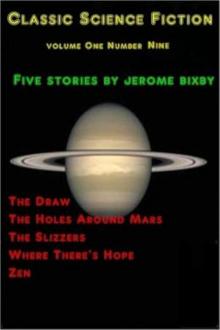 The Draw
The Draw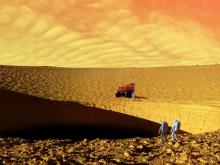 The Holes Around Mars
The Holes Around Mars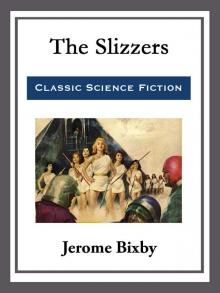 The Slizzers
The Slizzers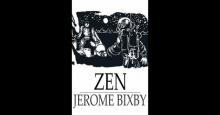 Zen
Zen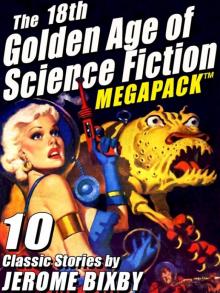 The 18th Golden Age of Science Fiction MEGAPACK ™: Jerome Bixby
The 18th Golden Age of Science Fiction MEGAPACK ™: Jerome Bixby